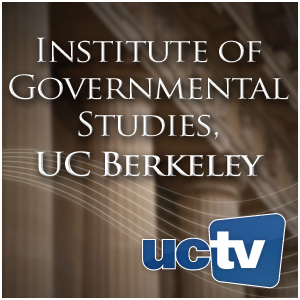5m ·
Published
08 Aug 21:00
Today, we need to make intelligent management decisions about how we are going to manage our planet. Fortunately, powerful computing technologies now allows us to see with clarity what lies ahead, and to make informed choices about what path to take. We forecast a 20 percent decline in global income by the end of the century. And the most intense economic losses will be experienced in places where it is already hot and economies are already stressed. The vast brunt of the global economic burden will be borne by the poorest 60 percent of people around the world, widening global economic inequality. Our challenge is to use our unprecedented access to data analysis and information technologies to make truly informed decisions about the world we want to live in and leave for Series: "UC Public Policy Channel" [Public Affairs] [Show ID: 33084]
2m ·
Published
07 Aug 21:00
Plants have evolved the capability to convert atmospheric CO2 into biopolymers and therefore represent distributed systems for carbon removal that are highly scalable. Wolfgang Busch, Ph.D., Associate Professor Plant Molecular and Cellular Biology Laboratory, Salk Institute, explains the possibilities of efficient carbon storage in plants. Series: "Exploring Ethics" [Science] [Show ID: 33883]
4m ·
Published
07 Aug 21:00
Bending the threatening trajectory of global climate change surely seems daunting. Max Auffhammer argues that a single powerful tool can generate major change worldwide: price incentives. His focus is the social cost of carbon -- an estimate, expressed in dollars and cents, of the damage that one ton of CO2 emitted into the atmosphere has on the entire globe. This is a number that governments should use to evaluate the benefits and costs of new regulations that affect greenhouse gas emissions. Series: "Cal Future Forum: Our Changing World" [Public Affairs] [Show ID: 33073]
5m ·
Published
06 Aug 21:00
As of May, 2017, about 90 percent of all countries around the world have committed to the ambitious Paris Agreement to combat global climate change. But how to confirm that countries are maintaining their pledges, and how can they be encouraged to do better than their pledges? Berkeley climate modeler Inez Fung is part of an international scientific team refining the detection skills of the new Orbiting Carbon Observatory 2, launched in 2014. Series: "Cal Future Forum: Our Changing World" [Science] [Show ID: 33069]
4m ·
Published
02 Aug 21:00
Our homes and buildings consume huge amounts of energy – up to 40 percent of all energy use in the US. Research at Berkeley Lab has greatly boosted energy efficiency in buildings but the challenge now is not just how much energy we use, but when we use it. We need to shift loads to times when there are plenty of renewables in our electric system, and reduce load at other times of the day. New technologies will get our energy production and our energy consumption talking to each other. Series: "Cal Future Forum: Our Changing World" [Science] [Show ID: 33078]
5m ·
Published
02 Aug 21:00
Fossil fuels have powered economic growth and improved quality of life for more than two centuries – and for good reason. They can store a great deal of energy, and it can be used any time. The challenge for the scientific community is how to gain flexibility from renewable sources. Ravi Prasher and his colleagues have pioneered efforts to use computing power to discover new materials. His group then synthesizes the materials, and finally makes devices to test in the real world. He stresses that researchers are doing what they must: moving toward a future when we can assure steady, flexible, economical clean energy. Series: "Cal Future Forum: Our Changing World" [Science] [Show ID: 33079]
53m ·
Published
01 Aug 21:00
As humankind faces massive changes in weather patterns, sea level, ocean acidity, and oxygen levels, Scripps Oceanography has launched a new center focused on understanding and adapting to the impacts of climate change. Mark Merrifield, Director of the Scripps Institution of Oceanography Center for Climate Change Impacts and Adaptations explains how the members of this dynamic network will develop strategies for climate change adaptation. Series: "Jeffrey B. Graham Perspectives on Ocean Science Lecture Series" [Science] [Show ID: 33720]
5m ·
Published
26 Jul 21:00
In this century, the climate is changing faster than ever. Ecologist David Ackerly has been studying how fast plants and animals may need to migrate uphill or northward as the planet warms in order to remain in their preferred temperature regime. These velocities could be as high as five miles per year -- exceeding the ability of most species to disperse and establish new populations. Series: "Cal Future Forum: Our Changing World" [Science] [Show ID: 33074]
4m ·
Published
26 Jul 21:00
No single clean energy technology can rein in carbon dioxide emissions. Researchers at the Berkeley Lab aim to add artificial synthesis to our renewable energy portfolio. The technology uses sunlight to turn CO2 and water into chemical fuels. Over the past decade, research led by Peidong Yang has yielded new classes of semiconductor materials to efficiently capture sunlight for this process, and new types of catalysts to promote the chemical reactions Series: "Cal Future Forum: Our Changing World" [Science] [Show ID: 33080]




























































































